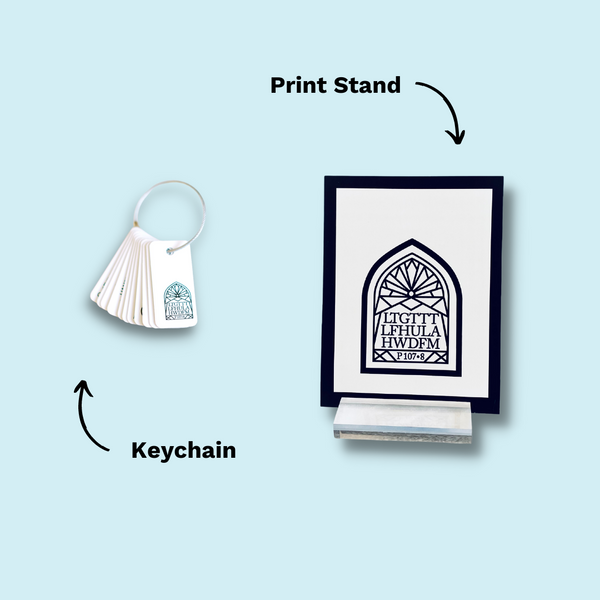"FOR THIS GOD IS OUR GOD FOR EVER AND EVER; HE WILL BE OUR GUIDE EVEN TO THE END." — PSALM 48:14
I never ask my mom for movie recommendations.
It’s not because she doesn’t enjoy the same movies that I enjoy. It’s not because she has no sense of humor or doesn’t love a good rom-com. Not at all. Whenever I see a movie with her, we’re always laughing at the same parts and crying at the same parts and looking over at each other while we’re crying and then laughing at each other. I really love watching movies with my mom, and yet I never follow her advice for what to watch. Why? She almost never watches a full movie. She’s always getting up to grab something or answering a call or even falling asleep! I can’t tell you how many times she tells me, “That movie was good, but it kind of didn’t make sense.” And I always laugh and ask her what percentage she actually watched! If you want to understand and appreciate a movie, you have to watch it all the way through.
And our memory verses are no different.
If you want to understand and appreciate a Bible verse, you’ve got to see it in the context of the full story. Doing so is good and safe. Good, because there are always more riches to be found in God’s Word. And safe, because it will keep you from misunderstanding and misapplication. So today we’re going to see how Psalm 48 and our verse fit into the bigger story of the Bible in order to find the goodness of what God has for us and the safety of right understanding and application of our verse.
Have you read all of Psalm 48 before?
It’s a beautiful Psalm about God dwelling with his people. And like our verse says, he is and always will be the same God forever and ever. And he will guide his people to the very end. This is incredible, is it not? But, if you’ve read Psalm 48, you also know that this is a song that was originally sung by the people of Israel praising God for dwelling in the physical temple in the actual city of Jerusalem at a time when God had saved them from real enemies. So while we love this verse, what does it have to do with us, right now, in the 21st century? God no longer dwells in a physical temple in the actual city of Jerusalem. Was this psalm really just for ancient Israel? Or can you and I sing this song too?
We can and we should.
We only need to follow the threads of the themes we see in this psalm throughout the whole story of the Bible. The main idea of Psalm 48 is that God is dwelling with and saving his people. And the main idea of our verse is that God is unchanging and will alway guide his people. If we look (briefly) through Scripture, we see these themes throughout both the Old and New Testaments. Let me take you through just a couple of the beautiful and terrible iterations of this theme in the beginning of the Bible, in the middle of the Bible, in the lives of New Testament believers, and on into the future.
In the beautiful beginning of the Bible, God dwells with his people in unhindered, full intimacy. But into this perfection, man introduces the terrible reality of sin, and this results in separation from their holy and perfect God. Yet, even after their rebellion, God still wants to dwell with his people. So he promises to send a Son to crush evil, save mankind, and restore the broken relationship between God and humanity.
If we move on to the middle part of the story, where we find our verse, we see that God’s promise to crush evil, save mankind, and dwell with his people is in motion. God dwells among his people in his temple in the holy city, Jerusalem. And the people live in blissful safety with their God as long as they follow and worship him. This is the joy and worship we find in Psalm 48. But it doesn’t stay that way long. Rather quickly, the people succumb to the terrible temptation to not follow God or worship him rightly. And after centuries of warnings, God finally sends his people into captivity. The temple, where God was with his people, is destroyed, and all seems lost. Yet this unchanging God still longs to dwell with his people, so even in their captivity, he promises again and again to save them, to crush evil, and to dwell with them once more.
Fast forward with me to the New Testament. Here we see how all of God’s promises find their “yes” in Christ Jesus (2 Corinthians 1:20)! God sends his Son, Jesus, to live the perfect life that no one else ever could, die the death his people deserved, and rise to life and victory forever. Jesus crushed evil. Jesus saved his people. Jesus restored the broken relationship between God and mankind. Now, for all who believe in him, God dwells not just with us, but in us by his Holy Spirit. The dwelling place of God is now his people (Ephesians 2:22).
But that isn’t the end of the story! Our verse, Psalm 48:14, says, “This God is our God for ever and ever.” He is the God of his people not just way back in the beginning, or just in the middle, or even just now. He is God into eternity! His relentless mission to dwell with his people will find its fullness when his kingdom comes on earth as it is in heaven. On that day, there will be no sun, for God will be the light. There will be no temple for he will dwell with us face-to-face (Revelation 21:22-26). And there will be no more evil or sin or sickness or sadness or death (Revelation 21:4). God himself will crush every evil forever. And he will be our God and we will dwell with him forever (Revelation 21:3).
That is the story of “this God” who “is our God.” He is forever—trustworthy and true. And his unhindered, unending love will find us out and make us his own, even as we fail him over and over again. His purposes will not be thwarted. And just as the story of redemption in the Bible is the ever increasing revelation of his love for us, so our lives and our eternities are meant to be the ever increasing joyful worship of him—the unbegun beginner, the God of our messy middle, and the faithful completer of our story. Surely he will be our guide, leading us to himself, even to the end. In light of all of this, we can say the words in our verse with full hearts, holding onto “this God” who “is our God.” Would you say them one more time with me?
“For this God is our God for ever and ever; he will be our guide even to the end.” — Psalm 48:14
Amen and amen.




